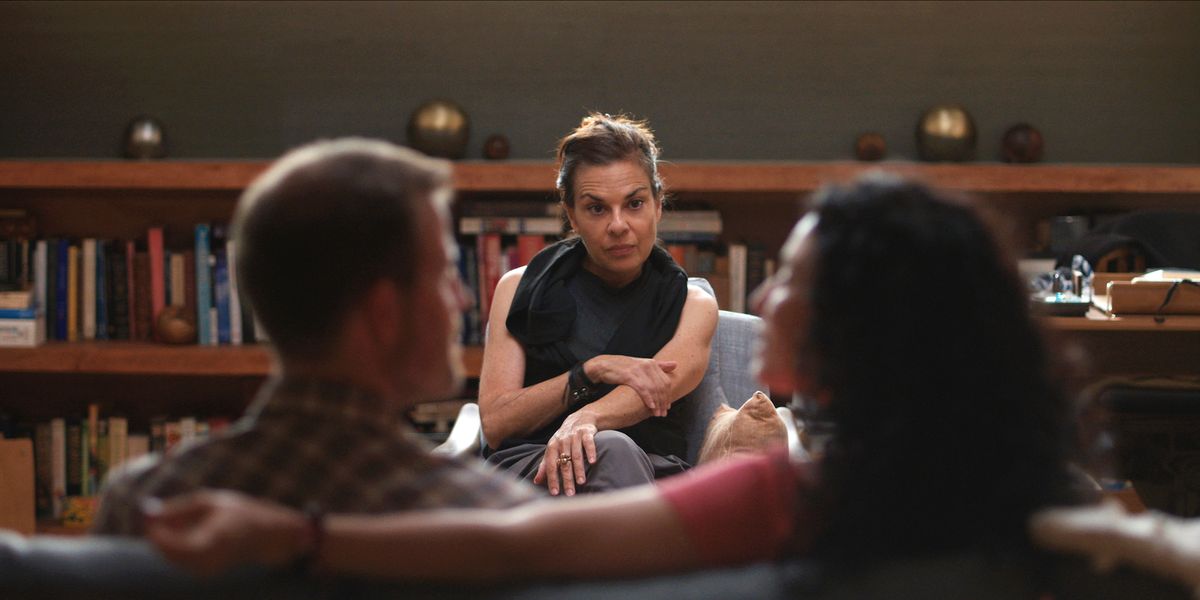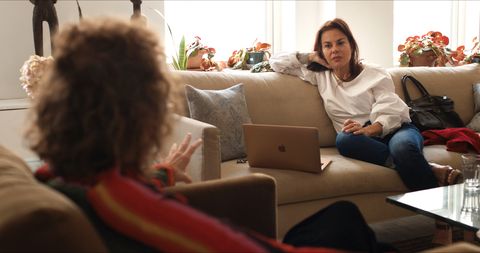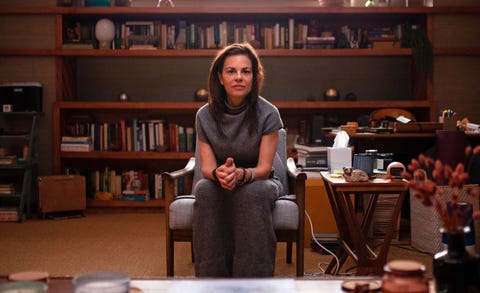In the second episode of this season of Showtime’s enthralling documentary series Couples Therapy, one partner in a couple, Cyn, remarks that kids, like dogs, are drawn to her wife, Yaya. Their session is just starting, and the show’s resident psychoanalyst, Dr. Orna Guralnik, responds by asking Cyn what she means by that. She says she’s okay with it, but Guralnik pushes her to say more, asking, “But what do you make of it?” Cyn describes Yaya as motherly, adding that it’s in her nature, it’s a good thing, and that there’s nothing wrong with it. Guralnik counters that perhaps Yaya’s motherliness, as Cyn sees it, might be getting in their way as a couple. Cyn’s face lights up with a realization she didn’t previously reach: She feels mothered by Yaya. As Yaya responds by asking Cyn if she’s treated like one of the kids, Cyn turns to Guralnik and says, “Orna, you don’t ease into this stuff, man.”
The hit show, which premiered in fall 2019, follows a cast of couples on their 20-week therapeutic journey with Guralnik. It exhibits a commendable vulnerability in its participants as well as uneasy confessions that may cause second-hand embarrassment in even the most empathetic among us. In that way, the show accurately depicts therapy, save for the potentially millions of viewers tuning in to observe a couple’s most intimate accounts of their relationship. But amid the varying personalities and stories shared by each couple in each season—and rest assured, some are truly memorable—the outstanding, if reluctant, star of the show is Guralnik. Insightful, thoughtful, and a master of reading people and their motives, she navigates even the most difficult conversations with a firm, fair-minded, and approachable empathy. I sat down for a conversation with her in a café in Brooklyn to talk about the one subject she rarely broaches on the show—herself.
Where did the idea for the show come from?
The originators of the show, who are the directors and producers, their whole idea was to create a show that closely follows what a therapeutic journey really is. Their whole idea was to actually not intervene at all, but to somehow create a situation where what happens in real therapy and good therapy can be captured. So it’s the opposite of anything sensational, the opposite of anything produced, and that’s what drew me to the project. I had a lot of trepidation in the beginning and disbelief, like ‘How could this ever work?’ But the idea was amazing.
What were you apprehensive about in terms of being a therapist on television, albeit in the docu-series genre?
From what I’ve seen in film and in the bit of TV that I’ve seen, when people try to depict what therapy is like, it often cheapens it and makes it not anything I can relate to as an analyst. A lot of it has to do with how therapy works and the concept of transference with people projecting onto the personhood of the therapist. And that’s one of the engines that pulls people in on TV—imagining things onto the therapist. But often what is imagined in real therapy, and then in how people relate to TV figures, people project a lot of fear. So these therapists are often represented as super exploitative of their patients or not interested in their patients, or either they’re too withdrawn and they fall asleep, or they’re over invested and want to sleep with their patients. Or they’re doing it for other selfish reasons. People project a lot of fears onto this mysterious object of the therapist. And on the show, you have the opportunity to offer a kind of blank screen.
What’s most challenging about your work and then also being filmed doing your work on TV?
What’s challenging about being a psychoanalyst is that it’s a profession in which you commit to helping people carry the burden of their suffering. So you’re engaging with people suffering—and not only suffering, of course, but also their creativity and other things. But there’s also a lot of suffering everyone who does this kind of work carries with them when you’re committed to witnessing and carrying the burden of suffering.
In terms of the show, one of the challenges for me is having to put on makeup. Tending to my appearance in a way that I don’t do in my regular life, believe me, that is a serious challenge. But aside from that, it’s a big responsibility to represent my profession and do the work on demand. In my regular practice, there’s a feeling that there’s time. If this session doesn’t work out, there’s another session. Here, we have a max of 20 weeks, and I’ve got to show up fully every time.
Something that is always obvious to me is that we’re getting to know you, in a way, through your occupation, but we still don’t really get to know you. You come across as resisting the celebrity of it all despite being someone the audience enjoys watching.
You know, on the show, they wanted to get into my life in the same way they get into the couples’ lives, which seems to me like a completely natural inclination for a documentary filmmaker. As much as I might be interested in telling my story, and whether maybe I will, I think for the sake of people that I’ve worked with and people that I will work with, I have to keep a certain level of anonymity to give people the space to not be burdened by my story. So, when I’m interviewed, the same way that when they asked to film, I said you don’t want that—you don’t want that for your audience, you don’t want that for the couples, and I don’t want that for my patients. I don’t want to be a celebrity, I don’t believe that that’s what’s useful.
People talk about how my interventions are so good and I might have my own personality that’s in there, but a lot of what people are seeing in terms of how I intervene and what I do with couples is my training. I’m a psychoanalyst. I’ve trained for this for 20 years. Basically, what I’m trying to say is I think that sometimes people’s interest in me as a person is kind of a misunderstanding of what’s actually going on.
Can you tell me if there are parts of your upbringing that have influenced your decision to do this work?
Yeah, one of the things I’ve come to realize is really relevant to my work is that I was born here, moved as a child to Israel, then lived in other places in the world, and then came back here for grad school. So shifting between cultures and between languages has been a very important factor that primed me particularly to work with couples. Being in a couple is all about difference, and each person being deeply embedded in their own experience and having to contend with the fact that there’s a different way of seeing things that comes in the form of the other person. There’s always some kind of clash of culture, of ideology, of background, of loyalty, of legacy, that each person in the couple brings into the room. Shifting between cultures and between languages primed me to be able to understand differences, and to shift my empathy and identifications between the partners and between the other factors that are influencing each of the partners.
How does difference manifest in our communications in relationships?
Communication is a complicated thing, right? Most couples come into therapy saying they have problems communicating but what does that really mean? It can mean certain things like not listening well or not articulating one’s thoughts openly or clearly. It can be getting emotionally overexcited or shut down, so those can show up in the way people talk. But ultimately, problems in communication are just the tip of the iceberg that are really reflecting what people are trying to communicate about, which is difficult. Often people have profound differences between them that they don’t know how to navigate. So it shows up as if it’s problems in communication, but it’s not really the communication that is the problem. The problem is honestly facing certain differences or disagreements or different loyalties. And that’s where these deeply embedded differences between people need to be addressed.
Watching the show, it sort of contradicts a widely held belief certainly in this country—sometimes backed by data—that the two major reasons couples have conflict are sex and money. Are those issues really about something else entirely? Or, perhaps let’s consider when Cyn reveals that she’s no longer attracted to Yaya—is that not simply true, or is it possible that something else is happening?
Sex and attraction are often arenas where other things are negotiated. For example, I’m writing about this couple who are arguing about whether the woman should buy a slushie or not, she wants to buy a slushie. And he’s saying, ‘We’re in the red in the bank, Do you really need a slushie?’ So it looks like it’s an argument about money, right? But it’s actually an argument about class. I mean, let’s unpack it. She comes from serious deprivation and is being told she can’t buy a slushie. Meanwhile, he comes from very steady generations of a very comfortable middle class. In his mind, he’s thinking ‘What’s the problem? Just don’t get a slushie right now.’ So it’s not really about money. It’s about class for them. It can also be about gender, politics, and power.
You’re talking to a psychoanalyst, nothing is just the thing.
One of the things I found intriguing right from the first season of the show was how you handled Black partners and Black couples and their dynamics. Anecdotally, there are numerous complaints of Black people seeking therapy with white professionals that at best reveals a gap in intercultural communication and understanding. Meanwhile, you seem to get it. I’m thinking of Dale and India this season, the former of whom is a Black immigrant, and of course you have a diverse group of fellow analysts shown on this season that come to your aid. How do you navigate these difficult conversations?
I’m a white therapist right? So, how white am I exactly? Because I spent age seven to 20-something years in Israel, and in Israel my first identification is with a family of Holocaust survivors. So it’s a very different victim identification and trauma contextualized in an Eastern European particular kind of history. Then I move back here, and here I’m a white person, and I have to take on the history of white people with slavery. It’s not my personal history, but it comes into me because I’ve lived here long enough and interacted with people long enough and now I understand I am now embodying that privilege. So these shifts and being conscious of them and taking them on and not refusing them is important.
I understand what it means to be kind of infused and identified with a certain culture and then moving out of it. I both know how to identify with it and also how to step out of it. In terms of understanding the Black experience, I’ve been working for long enough and I’ve seen different types of Black patients. The world comes to my office and people talk to me. So it’s a combination of this—and where my history does matter—is understanding these shifts between cultures. It primes you to understand that you don’t understand, so you need to listen and not assume. But it’s also my particular area of interest—socio-culture and how it affects the individual. I write about race, class, gender, and that’s my thing, and the directors were really interested in that aspect of the show too—how all of these ideological dimensions play out in private.
Finally, what is your hope for the legacy of the show?
I guess a few things are important to me. One is for people to understand what it means to negotiate difference, that a lot of it is like looking inward and thinking about unconscious dimensions. Another is for people to have more curiosity about the unconscious. There are a lot of unconscious forces that are running through us that include childhood and trauma, intergenerational stuff, and culture. And then again, for people to understand that being an analyst is a really serious responsibility that people don’t take lightly. I’m not different from any of my colleagues, people take their work super seriously. Hopefully that will dispel some anxiety that people have about engaging in therapy.
This interview has been edited for length and clarity.
This content is created and maintained by a third party, and imported onto this page to help users provide their email addresses. You may be able to find more information about this and similar content at piano.io


